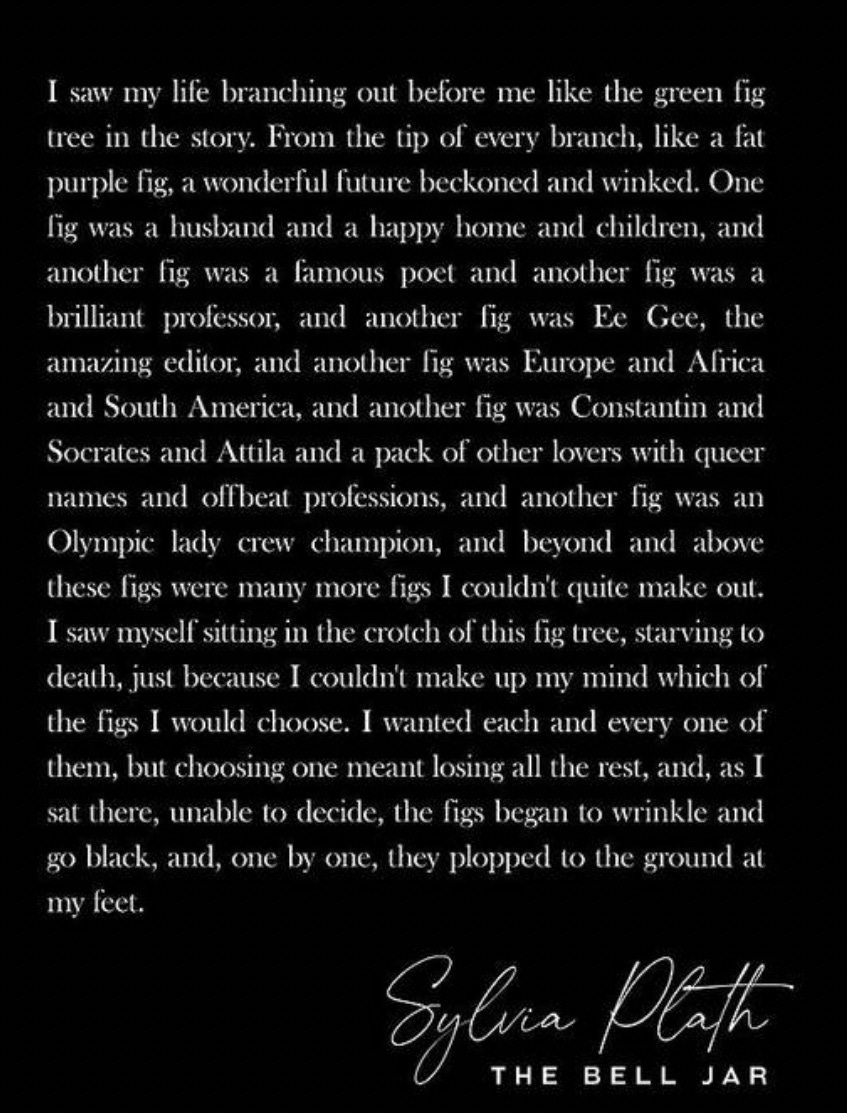“I get confused between emaciated and emancipated,” said Ella. We were about to take off. Her seat was in the upright position. She was showing me the book she’d brought for the flight. “Is that mine?” I said. Had she grabbed my copy off the shelf, extracted it from my Easter reading pile? Was she trying to be me? That was unlikely. Actually, it was her’s. It had the cover with the pretty girl with the half-face, one eye, some lips. It gave no indication that it was a tale about madness and electric shock therapy and suicide and the struggle to survive as a woman in a world that was strangling you. It seemed another teenager had given it to Ella for her sixteenth birthday. Apparently, The Bell Jar was all over TikTok. I knew about Sylvia Plath, her frustrations as a writer, her ambivalence towards motherhood, her fear of domesticity, how she’d turned on the gas and stuck her head in the oven. She was mainly famous for that and being married to a poet laureate who had left her for someone else. Ella knew about the fig tree. Sylvia had agonised over which path to choose in her life, meaning or pleasure, career or marriage? She’d turned her turmoil into a literary metaphor, her reality into fiction. She’d given Esther, her protagonist, decision paralysis, a future that winked, figs that wrinkled and went black and plopped to the ground at her feet.
Ella had a Pinterest board called “My Fig Tree” or something like that. It was filled with images of the places she might or might not visit, the jobs she might or might not do, the outfits she might or might not wear, the lives she might or might not live. She knew for every choice made, there was a myriad of other possibilities that would have to be unchosen. But sure, a life lived on Pinterest was almost as good as a life lived. On TikTok, some were never not thinking about Sylvia’s fig tree. It was giving them all the feels. It was FOMO on speed. It was haunting #BookTok. Those obsessed with it may or may not have read the rest of the novel, got to the bit about Esther’s overdose and admission to an ‘asylum’. They may or may not have known the context of the fig tree quote, that Esther is on yet another boring first date with a man who is too short for her, who may or may not entrap her into curtailing her ambitions and cooking three meals a day for their offspring. “Maybe it was true that when you were married and had children, it was like being brainwashed, and afterward you went about numb as a slave in some private, totalitarian state,” she says. As she looks round at all the other women, she makes a list of all the things she can’t do - dancing, singing, balancing, horse-riding, skiing, multilingualism, shorthand, and she desperately needs shorthand because that’s the only option if she wants to become financially independent. She has a vision about a fig tree. “I don't know what I ate, but I felt immensely better after the first mouthful. It occurred to me that my vision of the fig-tree and all the fat figs that withered and fell to earth might well have arisen from the profound void of an empty stomach,” she says once she’s had her dinner. The TikTokkers may or may not have understood what hunger can do to the mind.
“Stay strong,” I said last Friday as I closed the door of the salon and breathed a sigh of relief. My hairdresser could be moody, but this was even worse than usual. I asked about her endometriosis and her slipped discs and her physiotherapy and the waiting lists. It wasn’t that. Her back had been fine recently. It was ironic really. “Man trouble?” I said. And I listened to how her partner had ended their relationship. He couldn’t cope with her. She was making him resentful. “It’s all my fault,” she said. She was living in his house. He’d given her three months to find somewhere else. Somehow, she needed to get back on her feet, but he had left her in a precarious financial position. She would no longer have access to her stepdaughter. And it wasn’t always about indecision or losing the rest, as all the fat, purple figs she’d chosen had been taken away from her.
On TikTok, a man was asking whether The Bell Jar lived up to its hype. “Esther struggles with the expectations of women in the 1950s,” he says. “She’s torn between the desire for personal fulfilment and traditional gender roles”. “Hmm,” he said as if she was torn between red and white wine, and he had no particular preference. The iconic fig tree metaphor was a little too long for him to get into, but he planned to summarise it on his YouTube channel. He felt the novel was more character than plot driven. He’d expected it to be more of an entertaining read.
I would think of my hairdresser again as I watched Poor Things. “You’ll enjoy it,” said someone. “It covers God and death and feminism”. It had been billed as an odyssey of self-discovery, a coming-of-age movie, a subversive reinterpretation of Frankenstein. I was wowed by the cinematography but unsettled by the excessive access to Emma Stone’s perfectly groomed body. I wanted an Oscar-winning actress who had stretch marks and Victorian cellulite and childbearing hips. I reckoned Bella’s liberation in an era when women were primarily property couldn’t be done as sweetly as Barbie. “A woman plotting her course for freedom. How delightful,” says Swiney, the brothel madame, and I wasn’t sure whether we were meant to view prostitution as Bella’s only option until a man comes to rescue her or acknowledge that emancipation always comes at a cost. And I worried that the over-emphasis on furious jumping might mean we’d miss the spontaneous dancing and really the whole film was about the discovery of that wonderful, ridiculous state of being alive.
It seemed by defying social norms, Bella got to try all the figs on the fig tree and the whole smorgasbord of Pinterest with neither shame nor regret but in the end, she chooses intellectual pleasure over everything else. And I guess we are supposed to think something profound about a woman who kills herself whilst pregnant, who when reincarnated, studies to become a surgeon, and maybe Sylvia Plath was right, and the figs are mutually exclusive. It would take two lives to do all of it. And obviously, Bella needed money to plot her course to freedom and so does my hairdresser, but Bella could relax about her freedom because she had inherited her ‘father’s’ fortune.
“I am afraid of getting married. Spare me from cooking three meals a day - spare me from the relentless cage of routine and rote. I want to be free,” wrote Sylvia Plath.
And I wasn’t going to write about any women this week, I was going to write about Barack Obama because there was an article about how, age 62, he has a flat stomach and they put it down to carefully separating the fat and the sugar on his plate, and a horror of mayonnaise, and removing the M&Ms from trail mix and I remembered my favourite ever paragraph because Michelle wrote it1 and I wondered if deep down, she’d like her brain freed too.
“As long as I’ve known him, Barack has never derived pleasure from shopping, cooking, or home maintenance of any kind. He’s not someone who keeps power tools in the basement or shakes off work stress by making a risotto or trimming hedges. For him, the removal of all obligations and worries concerning the home made him nothing but happy, if only because it freed his brain, allowing it to roam unfettered over larger concerns, of which there were many”.
“You don’t want to be emaciated,” I said to Ella, “but you do want to be emancipated”. And I needed to tell my daughter that being emancipated has a lot to do with having your own money…
Am I right? Let me know…
Becoming.






Yet again I echo my offer to do anything I can to help once you have that book in working order – your writing continues to blow me away x
I'm with Katie G. Write that book!